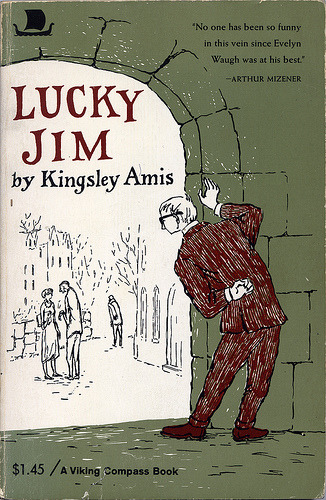[The above video is mostly a
reading of the text below, with an occasional aside thrown in for good measure
as they strike me as relevant. I welcome questions, comments, or concerns about the material contained in
this video.]
This isn’t exactly the book that I thought that it would be, which may be a result of the time between when it was first published in the early 1950s and when I read it. When I hear the words “campus novel genre,” I think academic politics, the intertwining personal lives of wry, well-educated professors, and perhaps some insight into them as people – usually with a good dash of humor thrown in for good measure. “Lucky Jim” has many of these elements, but there’s much more of “sordid private life” angle here than I was expecting. While in high school, I read a few of the English literary critic and author David Lodge’s novels, which could also appropriately be called campus novels (“Small World,” “Nice Work,” and “Thinks…”), and they managed to contain more of a balance of the above elements. Maybe it’s because my first experience with the campus novel was with Lodge’s work that I compare all subsequent ones to his, which I found to be truly wonderful. Even though Lodge doesn’t seem to have garnered much appreciation in the United States, I would recommend him to anyone interested in this type of fiction.
Jim, who isn’t really all that lucky for much of the novel, is a lecturer in medieval history trying desperately to be taken on permanently; because of this, he feels the need to impress and comply with the wants and needs of Professor Welch, the head of the history department. Jim has started seeing Margaret, still another member of the history department, who has recently tried to take her own life after a failed relationship. Welch, on the other hand, is a tremendously affected, pedantic boor who throws parties where he inflicts attendees with musical ensembles and readings from plays. On the first of these excursions, Jim meets Welch’s son Bertrand, an equally bloated artist manqué and his girlfriend Christie. Christine’s uncle, however, is an influential Maecenas through him he seems himself furthering his own career.
In addition to being a terrific drunk, the private lives of many of these people are in utter shambles. This may be some more of the intended social-political commentary that Amis was aiming at (see below). Margaret is a neurotic, Christine is seeing Bertrand but begins to see Jim while he’s still seeing Margaret, and Bertrand begins to see one of his father’s colleagues while he’s still seeing Christine. More of the novel than I would have liked consisted of Jim trying to decide between the merits of Margaret and Christine. Only at the end of the novel does Jim really become “Lucky Jim,” getting the girl, a job (though not the one he was anticipating at the university), and moving to London. I’ll leave the details for the “lucky reader.”
This was written before Kingsley Amis became more conservative in his politics, and therefore has a lot of tension between Jim, who comes from what Americans would call a working-class background and the Welches and their friends, who are solid Tories. Amis goes to tremendous lengths to show the shallowness, fascination with wealth, and political reactionism that permeates the Welches’ world. Only a family like this could have two sons, one (Bertrand) a painter, and the other who is several times throughout the novel described as “effeminate.” As I like to say, you get the children that you deserve.
I’m glad that I finally read this, since its reputation does precede it. The humor, such as it is, often consists of jabs at class structure in England sixty years ago, which is at several removes from what most contemporary Americans are going to associate with “being funny.” I found myself wishing that the characters were more likeable (as much as that word sends me into fits of bruxism, especially when applied to literary characters) and that their private lives less resembled the private lives of their teenaged students. It wouldn’t make my top one hundred list of novels of the twentieth century, though it seems to have made many others. And I can’t deny it its few moments that are laugh-out-loud funny.

No comments:
Post a Comment